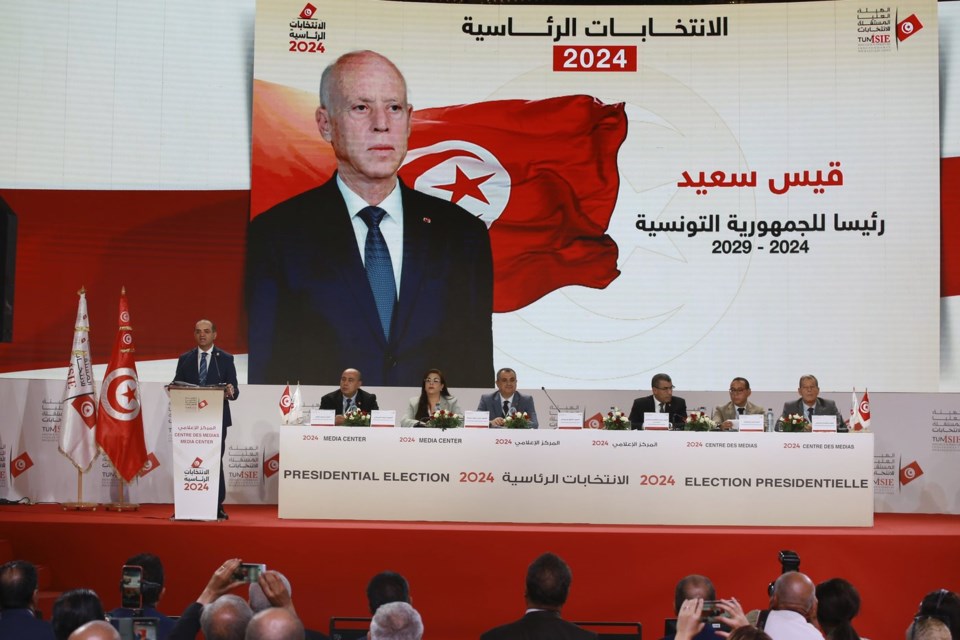TUNIS, Tunisia (AP) — Tunisia’s President Kais Saied won a landslide reelection victory in results announced Monday after a campaign season that saw his opponents jailed alongside journalists, activists and attorneys.
The North African country’s Independent High Authority for Elections, known as ISIE, said Monday evening that Saied had won 90.7% of the vote.
Saied's closest challenger, businessman Ayachi Zammel, won 7.4% of the vote after sitting behind for the majority of campaign season facing multiple prison sentences for election-related crimes.
University of Tunis law professor Sghayer Zakraoui said the results were reminiscent of Tunisia under President Zine El Abidine Ben Ali, who ruled the country for more than 20 years before becoming the first dictator toppled in the Arab Spring uprisings. Saied received a larger vote share than Ben Ali did in 2009, two years before fleeing the country amid protests.
“We’re heading for totalitarian, even dictatorial power," Zakraoui told The Associated Press.
Election officials reported 28.8% voter turnout — a significantly smaller showing than the first round of the country's two other post-Arab Spring elections and an indication of apathy plaguing the country's 9.7 million eligible voters.
The turnout and Saied's margin of victory reflected how his supporters participated in Sunday’s race while the majority of his detractors chose to boycott. Fewer Tunisians voted for Saied in this year's race than in the second round of his first election.
“He will re-enter office undermined rather than empowered by these elections,” Tarek Megerisi, a senior policy fellow at the European Council on Foreign Relations, wrote on X.
Yet the president and his supporters hailed the result as an endorsement of his efforts to transform Tunisia, eliminate corruption and redistribute power away from the country's reviled political class, including both those in power before the Arab Spring and those who entered politics immediately after.
“We’re going to cleanse the country of all the corrupt and schemers,” Saied said at his campaign headquarters on Sunday after exit polls showed him with a massive lead.
Such remarks echoed those he has made throughout his tenure, in which he used overtly populist appeals to accuse his detractors of being part of foreign or domestic plots to undermine Tunisia.
As the president and his supporters celebrated, his detractors pledged to keep opposing his rule. Amri Sofien, a freelance filmmaker, said after she heard that Saied had trounced his two opponents so substantially she thought political turmoil and protests wouldn't die down.
“It’s possible that after 20 years our kids will protest on Avenue Habib Bourguiba to tell him to get out,” she said, referring to the capital's main thoroughfare. “There is no hope in this country.”
It was Tunisia’s third presidential race since the 2011 Arab Spring, when protests for “bread, freedom and dignity” led to Ben Ali's ouster and paved the way for the country's transition into a multiparty democracy.
In the years that followed, Tunisia enshrined a new constitution, created a Truth and Dignity Commission to bring justice to citizens tortured under the former regime and saw its leading civil society groups win the Nobel Peace Prize for brokering political compromise.
But its new leaders were unable to buoy its flailing economy and quickly became unpopular amid constant political infighting and episodes of terrorism and political violence.
Amid that backdrop, Saied — then 61, a political outsider and a populist — won his first term in 2019.
As the economy continued to struggle, he began dismantling Tunisia's new democratic institutions midway through his tenure. In July 2021, he declared a state of emergency, suspended parliament and rewrote the constitution to consolidate the power of the presidency — a series of actions his detractors likened to a coup.
In the years that followed, voter turnout plummeted in the parliamentary and local elections. Authorities unleashed a wave of repression on the country’s once-vibrant civil society. In 2023, some of his most prominent opponents from across the political spectrum were thrown in prison, including right-wing leader Abir Moussi and Islamist Rached Ghannouchi, the co-founder of the party Ennahda and former speaker of Tunisia’s parliament.
Dozens of others were imprisoned on charges including inciting disorder, undermining state security and violating a controversial anti-fake news law critics say has been used to stifle dissent.
The pace of the arrests picked up earlier this year, when authorities began targeting additional lawyers, journalists, activists, migrants from sub-Saharan Africa and the former head of the post-Arab Spring Truth and Dignity Commission.
“The authorities seemed to see subversion everywhere,” said Michael Ayari, senior analyst for Algeria & Tunisia at the International Crisis Group.
Dozens of candidates had expressed interest in challenging the president, and 17 submitted preliminary paperwork to run in Sunday’s race. However, members of the election commission approved only the three. Upon publication of the final list of candidates, Zammel was promptly jailed.
The role of the commission and its members, all of whom are appointed by the president, came under scrutiny during the campaign season. They defied court rulings ordering them to reinstate three candidates they had previously rejected. The parliament subsequently passed a law stripping power from the administrative courts.
Bouazza Ben Bouazza And Annie Risemberg, The Associated Press



